- Details
Archived Webinar Series: Interpreting the Total Solar Eclipse of 2017 !
For the first time in over a century a total solar eclipse will be visible over the entire United States, August 21, 2017. This spectacular total solar eclipse will be visible within a 70-mile wide path stretching across the continental U.S. beginning in mid-morning on the Oregon coast, crossing the United States, and finally disappearing on the South Carolina coast by mid-afternoon.
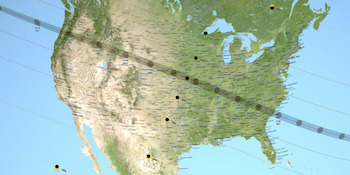 click for larger (high resolution) Those in the path of totality will have the rare opportunity to safely see the Sun’s corona, the beauty of Baily’s beads and the dazzling diamond ring effect. You can get a sense of how the eclipse will progress at your location at http://bit.ly/2ffhTdi
click for larger (high resolution) Those in the path of totality will have the rare opportunity to safely see the Sun’s corona, the beauty of Baily’s beads and the dazzling diamond ring effect. You can get a sense of how the eclipse will progress at your location at http://bit.ly/2ffhTdi
This eclipse will be a unique and powerful opportunity for sharing the excitement of science and the wonder of the Sun and Moon as they create a total solar eclipse on Earth.
The webinar series covers basics about solar eclipses, touches on NASA's research on the Sun, Moon and the Sun-Earth connection, and explores activities, resources and ideas for connecting the eclipse experience with major interpretive themes in parks, refuges and other interpretive sites.
You may view any or all of the sessions which were held January - March 2017.
Tuesday, January 24 – Basics of Solar Eclipses
Thursday, February 2 – Our Sun is an Above-Average Dynamic Star!
Tuesday, February 14 – Without the Moon There Would Be No Eclipse!
Thursday, February 23 – Earthly Connections to the Sun
Tuesday, March 7 – NASA Resources and Activities Part I
Thursday March 16 – NASA Resources and Activities Part II
Thursday March 23 – Interpret the Eclipse!
Webinar abstracts and access to archived sessions and resources are here (site login required).
Also visit our Eclipse Resources for Interpreters Page
- Details
Free Climate Science and Communication Mini-Course!
 What’s currently going on with climate change in Alaska, and how do we best engage audiences on climate issues? If you’ve been wondering about these and similar questions, save-the-date October 21st, and join the Earth to Sky interagency partnership for an in-person mini-course in Fairbanks, with our partners from NASA, National Park Service, and many other agencies and organizations. Join us!
What’s currently going on with climate change in Alaska, and how do we best engage audiences on climate issues? If you’ve been wondering about these and similar questions, save-the-date October 21st, and join the Earth to Sky interagency partnership for an in-person mini-course in Fairbanks, with our partners from NASA, National Park Service, and many other agencies and organizations. Join us!
- Meet with world-class scientists and communicators and explore the best practices and latest insights into understanding/responding to changing climate
- Hear about the latest research being conducted by the NASA Arctic Boreal and Vulnerability Experiment (ABoVE) Campaign in Canada and Alaska
- Learn tips on climate communication from experienced Earth to Sky alumni
- Explore new tools, including citizen science activities and stunning visual resources from NASA
- Discover useful online resources to help develop your understanding of and ability to communicate about climate
- Become part of a statewide community of engaged educators, working on the best ways to communicate about climate with audiences, both on-site and virtually
- Outline your own customized plan for presenting a climate program or designing a product for use at your work site
And best of all, learn how to stay connected to these scientists and communicators over time. You’re not alone in your efforts - and here’s proof there’s lots of help available!
Target Audience: Federal, State, Municipal, Non-profit and private organization communicators, school educators, and anyone interested in climate literacy. Participation by partners and collaborators is especially encouraged.
What: ETS@AK Mini-course 2016
When: Friday, October 21st, 2016
Where: Fairbanks, Alaska - at the Morris Thompson Cultural and Visitors Center
No Tuition Fee
Full Course Announcement: ![]() ETS-AK_2016_Minicourse-Announcement.pdf
ETS-AK_2016_Minicourse-Announcement.pdf
Application form: ![]() ETS-Mini-course-AK-Application-2016.doc
ETS-Mini-course-AK-Application-2016.doc
For more info or to add your name to our email list of those interested, Contact:
John Morris Earth to Sky - Alaska Coordinator
16542 Marcus Street
Eagle River, AK 99577
This email address is being protected from spambots. You need JavaScript enabled to view it.
907-947-0359
or
Anita Davis
Lead, Earth to Sky Interagency Partnership
Science Systems and Applications, Inc.
NASA Goddard Space Flight Center
This email address is being protected from spambots. You need JavaScript enabled to view it.
Office: (301) 614-6669 or (410) 480-0718
- Details
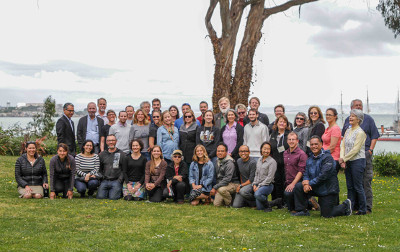 More than 60 scientists and science communicators gathered in San Francisco last month, to talk and learn about changing climate in the Pacific West. This was the second instance of a new regionally-focused training model that Earth to Sky hopes to take to many other regions of the country over the coming years. For three days, at the General’s Residence in Fort Mason, scientists/presenters from NASA and many other organizations including UC Davis, the Marine Mammal Center, federal and state agencies, and non-profit groups, discussed the latest news about climate impacts and their implications to the Pacific Coast. Funding and support for the course was made possible by the NPS Climate Change Response Program, Mather Training Center, and by continuing leadership and generous support from NASA.
More than 60 scientists and science communicators gathered in San Francisco last month, to talk and learn about changing climate in the Pacific West. This was the second instance of a new regionally-focused training model that Earth to Sky hopes to take to many other regions of the country over the coming years. For three days, at the General’s Residence in Fort Mason, scientists/presenters from NASA and many other organizations including UC Davis, the Marine Mammal Center, federal and state agencies, and non-profit groups, discussed the latest news about climate impacts and their implications to the Pacific Coast. Funding and support for the course was made possible by the NPS Climate Change Response Program, Mather Training Center, and by continuing leadership and generous support from NASA.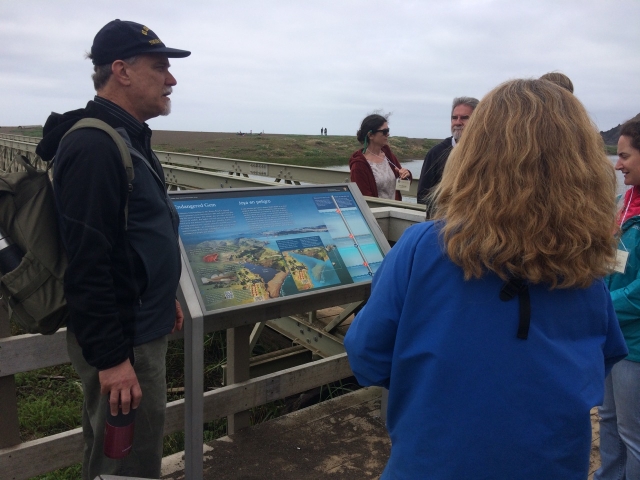
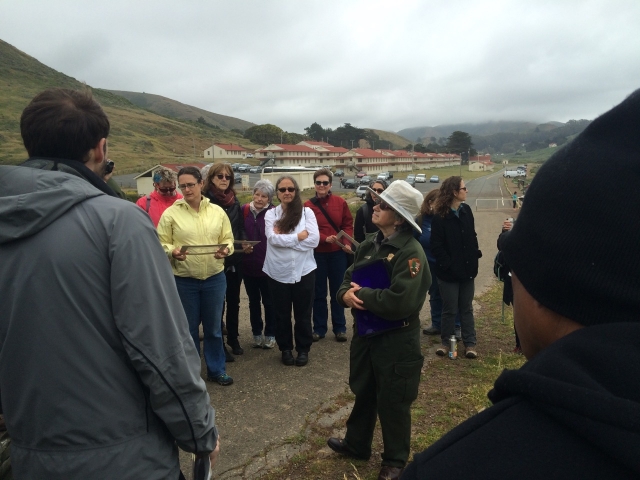 Among the many highlights of the course was a field trip to the Marin Headlands on Wednesday morning. The half day case study included presentations by Will Elder on several Sea Level Rise exhibits, Roxi Farwell demonstrating a ‘Magic Window” teaching tool that helps students see and understand geologic change on the landscape, Kerri McAllister illustrating citizen science and curriculum projects by her organization, NatureBridge, and concluding with a behind-the-scenes tour of the Marine Mammal Center in Sausalito, conducted by Adam Ratner, Guest Experience Manager.
Among the many highlights of the course was a field trip to the Marin Headlands on Wednesday morning. The half day case study included presentations by Will Elder on several Sea Level Rise exhibits, Roxi Farwell demonstrating a ‘Magic Window” teaching tool that helps students see and understand geologic change on the landscape, Kerri McAllister illustrating citizen science and curriculum projects by her organization, NatureBridge, and concluding with a behind-the-scenes tour of the Marine Mammal Center in Sausalito, conducted by Adam Ratner, Guest Experience Manager.Earth to Sky (ETS) is expanding its efforts through this course with new emphasis on partnering, and sharing new research specifically within a locally-based and engaged community of communicators and scientists. We are delighted with its successful launch, and look forward to the many future opportunities and new products that will surely result about changing climate in this region.
- Details
May 3-5, 2016
What’s really going on with climate change in the Pacific West? And how do you engage your audiences in climate issues?
 This workshop-style course led by partners from NASA, National Park Service, and other Federal agencies and non-governmental organizations, will provide participants with a foundation in climate science with emphasis on the connection of global to local processes. Our focus is on climate impacts of direct relevance to western coastal states. Join fellow interpreters and science communicators to
This workshop-style course led by partners from NASA, National Park Service, and other Federal agencies and non-governmental organizations, will provide participants with a foundation in climate science with emphasis on the connection of global to local processes. Our focus is on climate impacts of direct relevance to western coastal states. Join fellow interpreters and science communicators to
- Discuss and practice selected methods for successful climate communication, and become connected with the growing Earth to Sky community of practice – over 700 communicators and scientists from a variety of national and local organizations gaining and sharing expertise on this topic.
- Depart with cutting edge knowledge about climate change, and a plan for bringing the climate story to your visitors in engaging and inspiring ways.
- And learn how you can stay connected to these scientists and communicators over the long term. You’re not alone in your efforts – there’s lots of help available!
Target Audience: Federal, State, Municipal agencies, as well as non-profit and private organizations with science communicators, interpreters, environmental educators and education specialists. Participants should have some experience with communication principles and techniques. Knowledge of climate science is not required. Partners and collaborators planning to work together on joint projects are especially encouraged
When: Tuesday - Thursday, May 3-5, 2016
Where: The General’s Residence, Fort Mason, Golden Gate National Recreation Area, San Francisco
Tuition: $ 0.00 (Participants provide their own food, lodging and transportation)
This course is full, applications are no longer being accepted.
 Download the full course announcement
Download the full course announcement
 Download the application form
Download the application form
- Details
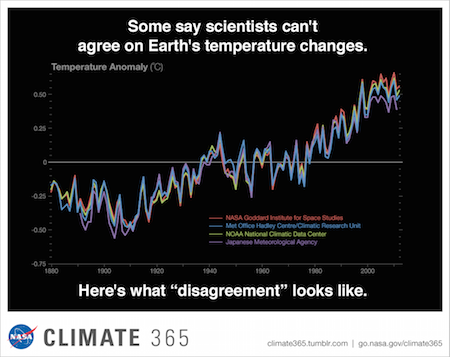 The international talks in Paris (COP21) seem to be all about carbon - how much there is in the atmosphere, the ocean, the plants, the permafrost and fossil fuels. How much carbon is moving, where, when, what can we do to alter the amount being released by human activity, how much do we need to reduce, etc. So, it seems an appropriate time to post a list of resources about carbon!
The international talks in Paris (COP21) seem to be all about carbon - how much there is in the atmosphere, the ocean, the plants, the permafrost and fossil fuels. How much carbon is moving, where, when, what can we do to alter the amount being released by human activity, how much do we need to reduce, etc. So, it seems an appropriate time to post a list of resources about carbon!
Here are a number of NASA resources on carbon, including short and long articles, short and long videos, visualizations and graphics. All are free, but please credit NASA if you share or use in your products/programs.
Feature Articles About Carbon
A Breathing Planet, Off Balance
As carbon dioxide levels in the atmosphere continue their rapid, man-made rise, NASA scientists and others are confronted with important questions: How long can this balancing act continue? And if forests, other vegetation and the ocean cannot continue to absorb as much or more of our carbon emissions, what does that mean for the pace of climate change in the coming century? This article explores this line of research and includes several downloadable visualizations.
More Articles
- Seven Case Studies in Carbon and Climate
- Seeing Forests for the Trees and the Carbon
- Carbon Content of Forests Overestimated
- Feature: The Carbon Cycle
- Carbon Emissions and Drought
- Carbon Dioxide Controls Earth’s Thermostat
Multimedia and Interactives
- ClimateBits: Carbon Dioxide (3 min) A nice explanation of the reason why carbon matters, stepping through seasonal and annual changes in atmospheric CO2 , consequences of added CO2 and actions people can take. Illustrated with visuals of the global greening and browning overlaid with the data from Mauna Loa.
- Fast and Slow Carbon – Banana vs. Coal (aka Carbon Crisis in 90 Sec.) A short, clear explanation of the carbon cycle, why it is out of balance, and why that matters.
- A Breathing Planet, Off Balance Video (3 min) A video that accompanies the article listed above.
- Details
 Earth to Sky Climate Change Science and Communication - A Regional Approach
Earth to Sky Climate Change Science and Communication - A Regional Approach
October 14-16, 2015
This course focused on climate science and communication as it applies to Alaska. The heart of the course was comprised of three days of face-to-face sessions held at the Bureau of Land Management's Campbell Creek Science Center in Anchorage, AK. It also featured one evening session, and a field trip to Portage Valley as a case study for climate change effects and communication practices.
The course preparatory assignments, video-taped presentations and all course materials are available on the course home page. We plan to conduct additional regional courses in a variety of locations in coming months and years.
Target Audience:
Federal, State, Municipal agency, as well as non-profit and private organization science communicators, interpreters, environmental educators and education specialists. Participants should have some experience with communication principles and techniques. Knowledge of climate science is not required. Partners and collaborators are especially encouraged.
Participants in this course:
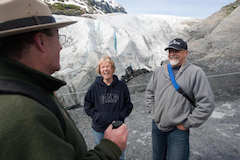
- Met with world-class scientists and communicators to discuss their best practices and the latest insights about understanding and responding to changing climate.
- Heard about the latest research in carbon and energy systems, specific to Alaska; learned the latest about NASA’s 9-year ABoVE campaign from the scientists themselves.
- Joined interactive sessions with specialists on many climate topics, including thawing permafrost, changes in hydrology, and new wildlife dynamics.
- Experienced climate research first-hand on a field-trip to Portage Glacier where researchers engaged directly with workshop participants.
- Became part of an engaged community of interpreters and educators, statewide, who are working on communicating about climate to audiences on-site, in communities, and virtually.
- Walked away with a customized plan for developing a climate program or product which, with partners, will be used at their sites with their audiences.
- And they learned how to stay connected to these scientists and communicators over the long term.
- Details
Earth to Sky Alumnus Named as a White House Champion of Change for Climate Education and Literacy
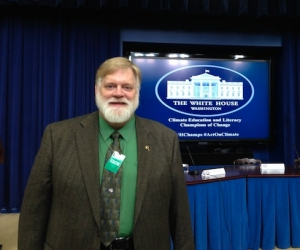 We are extremely excited that Earth to Sky alumnus John Morris (National Park Service, retired) has been honored as one of eight people selected as White House Champions of Change for Climate Education and Literacy. On February 9, 2015, a ceremony was held at the White House offices, to honor these leaders in climate communication/education.
We are extremely excited that Earth to Sky alumnus John Morris (National Park Service, retired) has been honored as one of eight people selected as White House Champions of Change for Climate Education and Literacy. On February 9, 2015, a ceremony was held at the White House offices, to honor these leaders in climate communication/education.
- Details
NEW Online Graduate Courses in Interpretation THIS FALL at SFA
Tuition Assistance Available
This Fall, Stephen F. Austin University (SFA) is piloting a year-long series of online courses, Science and the Public Interface, centered on the topic of effective communication of controversial science (such as evolution, climate change, nanotechnology, stem cell therapy, etc). The courses are developed by state, federal, museum, non-profit and university partners.
The 5-course sequence is designed to help you facilitate audience connections to science, place, each other and community, and provide opportunity to master 21st century science communication/interpretation skills including citizen science, framing, crucial conversations, facilitated dialogue, and community engagement.
SFA states that the courses will
- strengthen your ability to engage audiences about the process of science and what makes science controversial
- explore emerging techniques that lead to such outcomes as self-discovery, mutual understanding, respect, care, community capacity building, and stewardship
- outline a framework within which collaboration can emerge, helping audiences move from awareness to action.
Courses can be taken online through Stephen F. Austin State University at the 1-credit workshop or 3-credit graduate course level. Tuition assistance is available.
Apply/Register Now to join in the first semester of courses, beginning August 26, 2014 (Tuesday) and ending on or before December 12, 2014 (Friday)
![]() Additional course information, registration procedures, timelines, tuition and contact information.
Additional course information, registration procedures, timelines, tuition and contact information.

